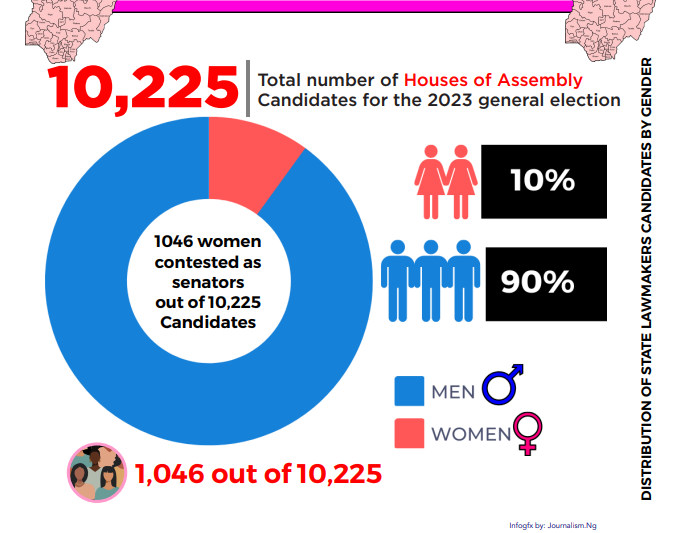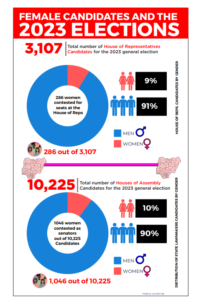Women, schoolchildren in Nigerian communities suffer as Gender Policy remains beauty on paper (2)

This is the concluding part of the report by JULIANA FRANCIS on how Nigerian leaders dilly-dally with the full implementation of the National Gender Policy, especially the 30% Affirmative Action goal, which advocates believe will check inequalities at the grassroots.
 women farmers battle poverty, lack of health facility
women farmers battle poverty, lack of health facility
In Ogun State is a community called Igbokofi, which shares a boundary with Benin Republic. The community is battling a lack of basic social amenities, including health Centres, water, school, and electricity and the women farmers have to trek through tortuous roads to sell their wares.
During rainfall, the people literary have to swim to get their wares to the market. If the wares fall, nobody buys them and if people do buy, the women sell at lower prices, affecting profit.
Their farm products are mainly maize and okra. Middlemen, who take their produce on credit, never return to pay for them.
The exploitation of these poor, illiterate women farmers, made Pastor Kunle Garb, who is at the centre of activities at Igbokofi, (Who is Garb? And what does at the centre of activities mean?) go shopping for an agriculture interest firm to buy produce, so they could make a profit and take care of their needs.
But these middlemen are the least of their worries. The major problem for them is the lack of a health centre, which gulps their almost nonexistent funds, and their horrible roads, which disturb the movement of their farm produce.
Sadly, none of the women our reporter interviewed could speak or understand pidgin, let alone the English Language.
It was gathered that maternal and infant mortality is high on this side of Ogun State. One of those consumed by death was Tosin Ayeni. (Is it possible to get the data?)
She died due to protracted labour. Ayeni’s father would also later die due to the shock of losing Tosin, who was his only child.
Garb said there are no qualified medical personnel in the community to attend to pregnant women and other medical emergencies.
He opined that if Igbokofi had a health centre, pregnant women and babies would not continue to die needlessly.
Recalling how Ayeni died, Garb said: “The baby was breeched, and the untrained doctors tried all they could and after eight hours, I had to threaten to arrest them if anything happened to her. It was at that point, that they referred her to another hospital. But hospitals are very far.”
Tosin was taken to different hospitals and rejected several times. She later died at the final hospital she was accepted, and a surgical session was done on her.
Garb added: “These women do not attend ante-natal let alone go for a scan. Ante-natal and scan would have detected that Tosin’s baby was breached, and something would have been done about it.”
One of the women, Janet, speaking through an interpreter, said that ante-natal costs money and as such pregnant women prefer to wait until labour pangs start before rushing to private clinics, which are mostly located in Benue Republic.
Janet, who has six children and is now pregnant with the seventh, recalled her experience when she had her twins. Nobody knew she was pregnant with twins.
When she went into labour, she was rushed to a private clinic, had the first baby and was discharged to go home by the doctor, but her husband said the new mother should not be rushed.
It was during the relaxation period that she started having contractions and then delivered the second baby. The second baby would have been born, either on the road or at home, at the risk of the mother or infant.
Garb said: “These women are exploited by people who call themselves medics in this community and many women, desperate for better medical attention go to Benin Republic, where their medical bills are usually tripled are from Nigeria.”
He said that there used to be a health centre in Igbokofi, but it was shut down 12 years ago because “medical staff complained of our bad roads.”
He further raged: “The most annoying thing is that this community has nine polling booths and no single health Centre! Election periods are the only time the abandoned primary health centre comes to life because it is used as a polling unit.”
According to Dataphyte, “The largest share of female household heads living in poverty are those involved in agriculture alone, it takes up a total of 37.75%. Those in diversified occupations make up 31.54% of female household heads living in poverty.”
Economic participation in Nigeria maintains that “Lack of access to finance hinders women’s economic potentials as well as their ability to decide on day-to-day business. Lack of government commitment towards women’s economic empowerment is hindering women’s participation in economic activities in Nigeria.”
Professor Abigail Ogwezzy-Ndisika of the Mass Communication Department, University of Lagos, a Gender Advocate, said women at the grassroots still find it difficult to access loans because they need collaterals like land.
She added: “For some of them, to get those loans requires their husband’s permission. Research has shown that when a woman is empowered, and economically sound, it reflects on the quality of the life of the children.”
The Inter-Parliamentary Union (IPU) says: “As of 1 January 2023, 11.3% of countries have women Heads of State-17 out of 151 countries, monarchy-based systems excluded-, and 9.8% have women Heads of Government-19 out of 193.”
According to the group, this is “an increase compared to a decade ago when figures stood at 5.3% and 7.3%, respectively.”
IPU maintained that the National Assembly of Nigeria has one of the lowest women representation in the world with only 3.6% in the House of Representatives and 7.3% in the Senate, below the global average of 26.5%.
Womendeliver.org stresses that women are agents of change and as decision-makers at “all levels are critical to advancing gender justice and gender equality and to furthering economic, social, and political progress for all.”
Womendeliver.org also states that women if fully represented and engaged in “legislatures, courts, executive boards, community councils-laws, rulings, and decisions are more likely to be inclusive, representative, and take diverse views into account.”
The group further debates that women’s leadership will improve access to education and healthcare, and cause lower levels of income inequality, among other benefits.
Naturalhr.com states that a comparative analysis between male and female leaders identified women as more transformational.
Women political and economic leaders across the globe have further proven this transformational tendency, touching the core of inequalities.
The 24th President of Liberia, Ellen Johnson Sirleaf, during her reign caused an executive order for education to be made free and compulsory for all elementary school children.
She launched the Center for Women and Development, after leaving office in 2018 and was awarded a Nobel Peace Prize for her work to empower women.
Angela Merkel, the first female chancellor of Germany, emphasised international cooperation and the strengthening of transatlantic economic relations. She reformed health care and advocated labour law changes.
Joyce Banda, the former President of Malawi, checked child abuse, improved relations with foreign donors and won approval from the international community, and the country’s economic growth rate doubled during her first two years as president.
Catherine Samba-Panza served as the Transitional President of the Central African Republic and a woman’s advocate. She came to power amid civil war, which she attributed to poverty and failure of governance. Samba-Panza’s reign ended before she could complete disarmament and national reconciliation.
Sanna Mirella Marin, a Finnish former politician, served as prime minister. She took over office at the age of 34 and led the response to the COVID-19 pandemic and Finland experienced lower infection rates and a quicker economic recovery than many other European countries. She caused Finland to apply and join NATO membership in April 2023.
Mette Frederiksen is a Danish politician who has served as Prime Minister of Denmark and the youngest prime minister in Danish history. She headed reforms and initiated diplomatic talks. She also caused educational reforms and opened the debate on the abolition of prostitution, insisting it was violence against women.
Dame Jacinda Kate Laurell Ardern New Zealand’s 40th Prime Minister of New Zealand, introduced strict gun laws and her response to the COVID-19 pandemic saved as many as 80,000 lives. She prioritised expenditure on healthcare and education.
Tsai Ing-wen is the first female President of Taiwan and is known for being pro-poor and pro-women. Taiwan’s economy grew under her leadership.
Theresa May, the prime minister of the United Kingdom, guided the U.K.’s exit from the European Union, tightening immigration and making many international decisions. She lobbied for improvements to maternity leave and acted on FGM.
These women give credence to the significance of having more women in decision-making positions, which can be replicated in Nigeria via compliance and implementation of the NGP.
Sirleaf sums up today’s present reality of women: “Increasingly, there is recognition that full gender equity will ensure a stronger economy, a more developed nation, a more peaceful nation.”
There are several Nigerian women, who exceeded expectations and impacted positively on their states, sectors and environments.
The former First Lady of Ekiti State, Mrs Bisi Fayemi, used her position to curtail Female Genital Mutilation (FGM) and other gender-based violence in Ekiti State.
Our reporter was in Ekiti State and discovered that the practice, although still being done, is now done in hiding and has continued to decline.
According to a report by the Federal Ministry of Women Affairs supported and published by the United Nations Population Fund (UNFPA) in 2021, an estimated 19.9 million women and girls were cut between 2004-2015, making Nigeria the third highest burden for FGM globally.
Kwara and Ekiti states recorded the highest levels of FGM between 2016 and 2021.
The National Library of Medicine, notes that “Nigeria has a population of 150 million people with the women population forming 52%. The national prevalence rate of FGM is 41% among adult women. It reflects deep-rooted inequality between the sexes and constitutes an extreme form of discrimination against women.”
A businesswoman in Iworoko Ekiti, Irepodun Ifelodun Local Government Area of Ekiti State, Adetola Omoyeni, said her two daughters were subjected to FGM, but vowed that with her exposure and awareness, she will not allow any of her granddaughters to be cut.
“I now know the health implications of the FGM. I lived in the north for several years and the practice is not in place there,” said Omoyemi.
An FGM survivor, Mrs Adebola Olawale, said that it was after she got married and tried to have sexual intercourse that she realised something was off.
Olawale recollected: “I got married at 24, I never for once enjoyed sexual intercourse. It became an issue between my husband and I. We eventually sought medical help. I had a series of tests where it was confirmed that something went wrong during the FGM carried out on me when I was young. The doctor advised us to always engage more in foreplay before sex.”
Mrs Funmilayo Omolola, a resident of Ado-Ekiti, Ekiti State, is yet to be converted.
Omolola said her daughter lives in Ibadan, Oyo State and had a baby girl and FGM was carried out on the granddaughter right there in the hospital.
She insisted: “The tradition attached to FGM is solid to the extent that some still believe it should be done. Civilization is now attached to everything. We seem to condemn what has been in existence from our ancient times. My granddaughter is hale and hearty.”
The Ekiti State Government reviewed the law that prohibited FGM with punitive measures for medical practitioners. It will attract the loss of their operational licenses and they will bag two-year imprisonment.
The traditional cutters are also included in the penalty with an option of a N200.000 fine if found guilty. But despite this, some practitioners in the state are still carrying on with the practice.
The Assistant Director, National Orientation Agency (NOA), Ekiti State /Directorate inside, Toyosi Eleyinmi, said that the Agency has continued in advocacy work, visiting eight local governments out of 16. The major targets were traditional rulers and religious and community leaders.
Eleyinmi recalled going to a community in Ikere with her team, where a traditional ruler told them that if they had come earlier to talk about the dangers of FGM, his granddaughter would not have died.
“The girl, according to him, was circumcised and bled to death,” said Eleyinmi.
She further recollected that during the COVID-19 lockdown in 2020, someone saw the NOA’s flyer on FGM and called the phone number on it at midnight.
“I called back in the morning, and she reported that her mom wanted to take her daughter for circumcision. She was in Port Harcourt. She reminded her mom about FGM and its attendant dangers, but her mom reminded her FGM was carried out on her,” Eleyinmi recounted.
Eleyinmi explained that she detailed NOA officers to Ikere, who met with the mom and spoke with her. “The child was saved. The rate of mutilation is gradually declining in Ekiti compared to before.”
The Gender in Nigeria 2020 report also touches on FGM, stressing that it is still prevalent in Nigeria despite the call for its abolition.
“Findings show circumcision estimates to be one in five Nigerian Women aged 15-49. Besides, 86% of female genital cutting occurs before a girl reaches age 5, with 5% of girls undergoing FGC before reaching the age of 15,” states the report.
Senator Oluremi Tinubu is another example of a woman politician, who used her position to champion Gender Equality and girl-child education.
Virginia Etiaba, the former governor of Anambra State, also the first female governor in Nigeria, despite her short reign, flagged off several road projects and signed the Anambra State’s Child Rights Bill into law.
Dr Ngozi Okonjo-Iweala, a voice for transparency in governance and the public financial sector, has also created positive waves in local and international communities.
Abike Dabiri-Erewa, chairperson of the Nigerians in Diaspora Commission (NiDCOM), tracks trafficked girls or Nigerians in trouble overseas, to bring them back home. She has particularly paid attention to women and girls abroad and works closely with NAPTIP.
Dabiri-Erewa championed and sponsored the Freedom of Information Bill (FOI bill) and the Violence Against Persons Bill, which have both been signed into law in Nigeria.
Other women game changers are the Late Dora Akuyili, Amina Titilayo Atiku-Abubakar, and Carol Ndaguba. Akunyili was director-general of the country’s National Agency for Food and Drug Administration and Control (NAFDAC) from 2001 to 2009. During her tenure, she led high-profile campaigns against ineffective drugs in the Nigerian marketplace, winning international acclaim.
Atiku-Abubakar advocated for women’s and children’s rights founded the Women Trafficking and Child Labour Eradication Foundation (WOTCLEF) and was the initiator of the private bill that led to the establishment of the National Agency for the Prohibition of Trafficking in Persons (NAPTIP). Ndaguba was the former DG of NAPTIP and repeatedly moved Nigeria to tier one in the international index in the fight against human trafficking.
In other countries like Rwanda, women make up 61.3% of members of parliament and in South Africa, women make up 46.5% of the parliament.
Rwanda intentionally 2003 approved a new constitution that included a quota system for women at all levels of government. The legislation mandated that 30 per cent of all representatives, including those in parliament, be women.
In Senegal in 2010, the gender parity law came into force through a gender quota of 50/50 called the law of parity. The law mandated all political parties to nominate an equal number of women and men on party lists and as constituency candidates. Also, political parties were not allowed to run elections if they failed to achieve gender parity on candidate lists.
Senegal and Rwanda are evidence that affirmative action will give women the needed edge.
The Executive Director of the Rule of Law and Accountability Advocacy Centre (RULAAC), Mr Okechukwu Nwanguma, said that the Nigerian government’s refusal to fully comply with the NGP is because the country remains a patriarchal society. The advocate noted that politicians generally do not see women’s issues as important.
He also opined that if the NGP could be obeyed to the letter, with women placed in political leadership positions, inequalities, especially at the grassroots would be curtailed if not outrightly eradicated.
His words: “The exclusion of women creates inequality. The space needs to be opened to allow for women participation and youth participation and this will help reduce inequality that exists in society. Inequality in terms of participation in political processes and economic independence.”
Nwanguma further opined: “The men who have occupied political positions for years have failed to address insecurity. Women have a way because they understand the pains of losing a child and husband, and they have a way of trying to advocate for peace.”
Supporting the call for compliance and implementation of the NGP, Nwaneri described the Abia State House of Assembly as shameful because there is not a single woman there.
He asked rhetorically: “Who then fights or speaks for the rights of women and girls in such an assembly? Also in the state executive councils, how many are women? In Nigeria, across the nation, only a few women are deputy governors, and such a number is insignificant.”
The Labour Party’s Deputy Governorship Candidate for Lagos State, Princess Islamiyat Oyefusi, a lawyer, said that a hundred per cent compliance will become possible only if NGP is enforced by the federal government.
She said: “The Federal government itself is not complying with it, so you cannot expect the states and local governments to comply with it. The NGP needs some form of uniformity across the board and it must be a Policy backed by law.”
Oyefusi explained that Nigeria as a country needs more female representatives in NASS to create gender laws, which will progress and advance women’s agenda.
According to her, “Without that, we will not reach that target of 35% we are trying to achieve, or we will not have enough representatives at the grassroots because when you create a position for women and the law says that this position is specifically for women, then women must be given that quota!”
Oyefusi insisted that without the federal law and adherence to the 35% Affirmative Action, women would continue to struggle, without attaining the much-needed numbers.
Oyefusi said that it has been proven that where women are at the top as decision-makers or leaders, there will be development and equality, which will translate to a successful economy.
She noted that when Nigeria signed up to the 35% proportional representative at all levels, it was a treaty that should have been turned into a domestic law.
She further said: “We need laws that must be implemented at NASS, that make the NGP compulsory across all the states of Nigeria, and for the 35% to be implemented for representation for women and people with disability.
“It is not a choice that must be given to them! We realised that these laws must be backed by affirmative action. For us to have equality across the board, the gender policy must be backed by law.
“For example, the People’s Democratic Party (PDP) has in its Constitution 35% representation for women, from the local government to the state, but when it gets to implementation, to appoint women, one will find that out of 10 positions, they will give just one woman.”
A Presidential candidate of the People’s Democratic Party (PDP), Dele Momodu, said that the Nigerian government keeps jettisoning the gender policy because Nigeria is largely a chauvinistic and patriarchal society, where men control most things.
His words: “It is almost global. Even in America, you can see that today, this is the first time they have a first female vice president. Things are changing, we are getting more women who are breaking barriers and saying that they are not just going to remain in the kitchen or the next room, they want to be in the Centre of action.”
According to Momodu, women are better managers and as such, if the 35% affirmative action is adhered to, the country will be better for it.
Momodu, who is also the publisher of Ovation magazine, urged Nigerian women not to agree to the stereotypes and added: “Look at that woman in Kogi State, Natasha Akpoti-Uduagan of the People’s Democratic Party (PDP), she lost the election but got it back because she didn’t give up. Women must continue to fight until they get what they want.”
Anugwom stated that the Nordic countries of Europe have remained some of the top-performing countries in terms of economic growth and human development.
“Finland is a wealthy country with about $54,000 in GDP per capita, 16th highest in the world. This is a good example of a country led by a woman. Other women leaders who left their good governance footprints in the sands of time are Angela Merkel of Germany and Mette Frederiksen, who is still the incumbent in Denmark,” said Anugwom.
She added that “Good governance and exemplary leadership works better from a top-down scope. Governors would imitate the government at the Federal level if they saw the president appointing more women into decision-making positions. Leadership by example from the top is what is needed to get Governors to follow suit.”
Ogwezzy-Ndisika noted that at the grassroots politicians and governors were powerful and could cause positive disruptions that can further help in the actualization of the NGP.
She said that the inequality of education at the grassroots is also reducing women’s participation in most events, stressing that there is now a need to be intentional to ensure that girls go to school.
She noted: “We also need to begin to do political awareness at the grassroots level for young girls. We should begin to have a girls’ wing for political awareness. We should begin to negotiate that political parties should mainstream affirmative action in their party constitution because the party is supreme and this will check equality in politics.
“If affirmative actions are to be mainstreamed in the party constitution to say, 35% or 30% of your elective positions be given to women, they will reserve 35 for women and when they do, women get the 35. The Federal Ministry of Women Affairs and other women-focused groups should begin to engage the political parties and INEC to mainstream affirmative action in their constitutions so that it can become part of the Electoral Act.”
According to UN Women: “If we don’t take decisive action to empower and enable more women to claim leadership in politics and public decision-making, we will not reach equality at the highest levels for another 130 years.”
This report was facilitated by the Africa Centre for Development Journalism (ACDJ) as part of its 2023 Inequalities Reporting Fellowship supported by the MacArthur Foundation through the Wole Soyinka Centre for Investigative Journalism.











